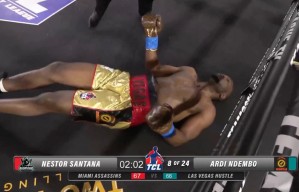A new ad campaign by Dunkin' Donuts launched in Thailand is being slammed by the Human Rights Watch for its alleged use of blackface to promote a new "charcoal donut," and the CEO of the donut company is defending it vehemently, the New York Daily News reports.
The new advertisement features a smiling woman with a '50s-era, jet black beehive hairdo covered in black paint holding up the company's new black doughnut, her lips painted a bright shade of pink. "Break every rule of deliciousness," reads the ad's slogan.
In the television advertisement for the new doughnut, a woman who bites into the it is then suddenly slathered in black from head to toe, and the Human Rights Watch is none too pleased about what they are calling an advertisement reminiscent of 19th and early 20th century American black stereotypes, including what appears to be a use of blackface.
"It's both bizarre and racist that Dunkin' Donuts thinks that it must color a woman's skin black and accentuate her lips with bright pink lipstick to sell a chocolate doughnut," Phil Robertson, the deputy Asia director for Human Rights Watch, said to the Associated Press. "Dunkin' Donuts should immediately withdraw this ad, publicly apologize to those it's offended and ensure this never happens again."
In Thailand, where use of American racial stereotypes is common, there doesn't seem to be any uproar so far. One Thai toothpaste claims that its herbal, dark-colored product is "black, but good," while a skin whitening cream that runs on Thai television purports that light-skinned people have better jobs than those with darker skin.
Despite the criticism, CEO of Dunkin' Donuts in Thailand, Nadim Salhani, dismisses the Human Rights Watch's criticism as "paranoid American thinking."
"It's absolutely ridiculous," Salhani told the Associated Press. "We're not allowed to use black to promote our doughnuts? I don't get it. What's the big fuss? What if the product was white and I painted someone white, would that be racist?"
Salhani argues that the new ad campaign increased the sales of the "charcoal donuts" by about 50 percent since it was launched just two weeks ago, adding that "not everybody in the world is paranoid about racism."
"I'm sorry, but this is a marketing campaign, and it's working very well for us," Salhani said.
Click here to see a photo of the advertisement on a train in Bangkok, Thailand deemed racist by the Human Rights Watch.








